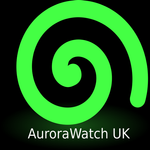
Get AuroraWatch UK status alerts to warn of possible sightings
advertisement
| Name | AuroraWatch UK |
|---|---|
| Version | 1.99 |
| Update | Feb 18, 2025 |
| Size | 4 MB |
| Category | Weather |
| Installs | 100K+ |
| Developer | Smallbouldering Projects |
| Android OS | Android 6.0+ |
| Google Play ID | com.smallbouldering.aurorawatchuk |
AuroraWatch UK · Description
The aurora borealis (or northern lights) is a spectacular natural phenomenon which can occasionally be seen in the night sky over Britain. Once seen, it is never forgotten. Aurora Watch UK allows you to monitor geomagnetic activity and will let you know when aurora MAY be visible from the UK.
Get alerts about increases in geomagnetic activity - triggered when the AuroraWatch status level changes; this indicates the relative likelihood of viewing an aurora in the UK.
See the current alert status - see Notes.
Read last 24 hours recent history.
30 minute forecast model from SWPC.
Please email aurora@smallbouldering.com with any issues.
PLEASE NOTE:
Aurora Watch is NOT a forecasting app.
Phone settings such as Battery Saver which limit the phone getting push notifications will narrow or even close the aurora alert window.
If you are not receiving alerts check your phone's Settings/Notifications/App settings to see that Notifications for Aurora Watch UK are not turned off.
The app does not alert historically. If your phone is off or unable to connect to the internet when the status goes up but the level goes back down before the next data update you will receive no alert.
There is a necessary delay before alerts are sent since the data needs to 'settle down' as recommended by Lancaster University.
The alerts provided by Lancaster University tend to default to their Lancaster magnetometer for alerting though they do have others; most importantly one in Shetland. Naturally there is a greater chance of seeing an Aurora in Shetland but since that data is not (usually) used alerts are a little more 'pessimistic'. This is appropriate for those of us living in England but less so for those further north.
The Aurora Watch UK (Android) app is developed and maintained by Smallbouldering Projects, it is not an 'Official' app.
Alerts data is provided by Lancaster University, UK using data from the SAMNET and/or AuroraWatchNet magnetometer networks: Read more about this here:
http://aurorawatch.lancs.ac.uk/introduction
Get alerts about increases in geomagnetic activity - triggered when the AuroraWatch status level changes; this indicates the relative likelihood of viewing an aurora in the UK.
See the current alert status - see Notes.
Read last 24 hours recent history.
30 minute forecast model from SWPC.
Please email aurora@smallbouldering.com with any issues.
PLEASE NOTE:
Aurora Watch is NOT a forecasting app.
Phone settings such as Battery Saver which limit the phone getting push notifications will narrow or even close the aurora alert window.
If you are not receiving alerts check your phone's Settings/Notifications/App settings to see that Notifications for Aurora Watch UK are not turned off.
The app does not alert historically. If your phone is off or unable to connect to the internet when the status goes up but the level goes back down before the next data update you will receive no alert.
There is a necessary delay before alerts are sent since the data needs to 'settle down' as recommended by Lancaster University.
The alerts provided by Lancaster University tend to default to their Lancaster magnetometer for alerting though they do have others; most importantly one in Shetland. Naturally there is a greater chance of seeing an Aurora in Shetland but since that data is not (usually) used alerts are a little more 'pessimistic'. This is appropriate for those of us living in England but less so for those further north.
The Aurora Watch UK (Android) app is developed and maintained by Smallbouldering Projects, it is not an 'Official' app.
Alerts data is provided by Lancaster University, UK using data from the SAMNET and/or AuroraWatchNet magnetometer networks: Read more about this here:
http://aurorawatch.lancs.ac.uk/introduction




